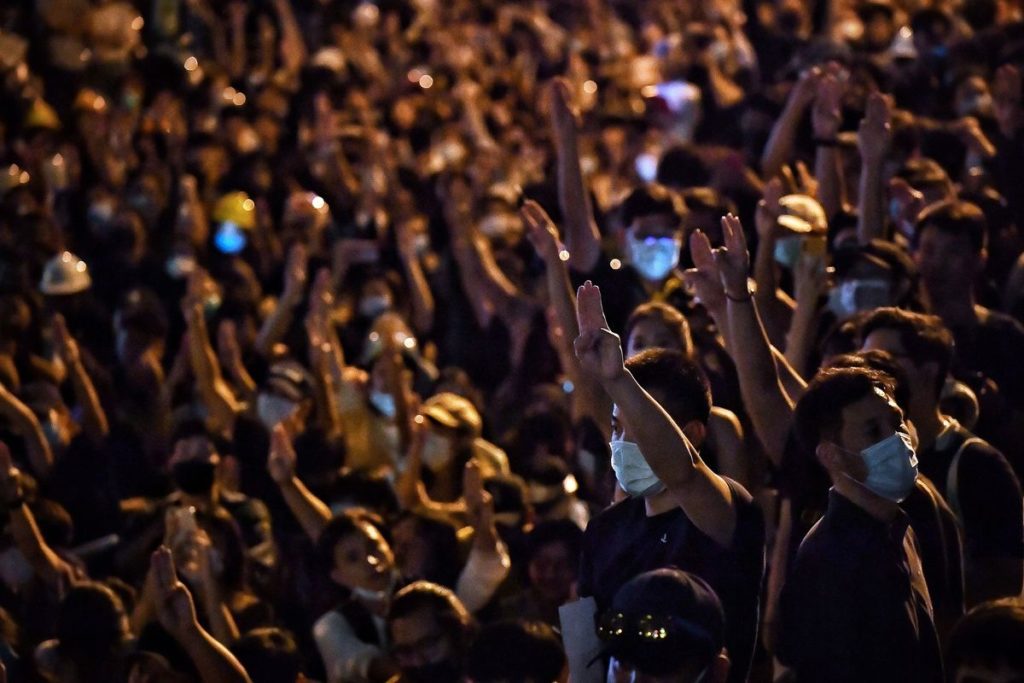
(Photo Credit: Lillian Suwanrumpha/AFP via Getty Images)
Can these five countries fix their current situations?
At the start of the year, vaccines and feelings of hope could have been the theme.
Yet rising covid-19 numbers and a growing number of variants has elevated the tensions over vaccines (and mask mandates) while slowing economies have struck at the hope (or aspiration) for V-shaped recoveries.
The lack of turnaround would be ‘okay’ per se if the failure of full-blown recoveries did not also appear to be weakening the social and political fabric of many emerging market countries.
On a global scale, people are angry at the current health and economic environment with protests becoming increasingly prevalent. The question for political analysts and investors is whether the anger and unrest boils to an unsustainable level for some countries.
Below are five countries to watch closely in the remaining months of 2021.
Lebanon
Not catching a break with a sovereign default, port explosion, and covid-19 in the last 18 months…
If the world was not grappling with covid-19, Lebanon would be the big economic storyline. The economic situation, simply put, is a disaster with the World Bank writing, “the Lebanon financial and economic crisis is likely to rank in the top 10, possibly top three, most severe crises episodes globally since the mid-nineteenth century.” Lebanese have witnessed the country’s currency plummet 95% against the dollar with the Lebanese pound now trading at 22,000 to the dollar on the black market. The government is running out of hard currency to subsidize staple products, including medicine and gas, with shelves empty in pharmacies and long queues at the gas station. The exit of Saad Hariri and entrance of billionaire businessman Najib Mikati sadly cannot fix the sectarian nature of politics in the country and the lack of foreign financial support. Now discussions of an army unable to pay its soldiers highlight the slow deterioration of public institutions in a country once viewed as the cosmopolitan haven of the Middle East. The world will continue to look to France, Saudi Arabia, and the U.S. for support…yet those three countries may not be aligned on next steps. If the usual allies do not help and international financial institutions sit on their hands, the admired Lebanese hope and perseverance that found its revival in the 1990s following the end of a brutal civil war may die. To be fair, that hope has fought a port explosion, economic collapse, and a covid-19 pandemic in the last 18 months.
South Africa
Covid-19 is exacerbating economic challenges and disparities…
The road to fixing the economy in South Africa was always going to be hard for President Cyril Ramaphosa. But the protests last month initially motivated by the jailing of ex-president Jacob Zuma demonstrated the political and economic challenges of the country. The protests quickly escalated to mass looting and the destruction of business and personal property underpinned by pent-up anger and frustration from many South Africans whose lives have economically snowballed downward. Many are jobless, poor and view their government as corrupt. Covid-19 exacerbates the situation with lockdowns punishing the poorest South Africans as wealthier South Africans has space at home to work and money to buy goods. The ban on selling alcohol felt maternalistic with wealthier South Africans hosting parties with alcohol in their gated communities. The economic disparity is not new (nor unique to South Africa) but covid-19 shined a light on the traumatic and disparaging effect of it. And things may only get worse before they get better. The appointment of Ramaphosa’s close ally Enoch Godongwana to succeed Tito Mboweni felt like a shakeup but it is believed that the former Central Bank governor Mboweni was ready to leave the job. Mboweni’s exit has some parallel symbolism to the feelings of international investors (who have slowly exited the country). The path forward for the country will be fraught with struggling commodity production, weakened African financial markets, and a battered private sector plus a potential influx of foreigners from struggling neighboring countries. So it goes…the Rainbow Nation really needs the storm to stop and the rainbow to return.
Brazil
Maybe a presidential race in 2022 can spur some change…
President Jair Bolsonaro is facing his biggest challenge as covid-19 endures in South America’s biggest country. The protests against masks and fights over lockdowns poorly mask (no pun intended) the increasing economic challenges in the country with federal social spending unable to solve for slow growth and lack of a pandemic solutions. The spending under the auxilio emergencial program, which provided monthly payments of R$600 to roughly 68 million Brazilians during the pandemic with single mothers receiving R$1,200, helped to win support initially during the covid-19 pandemic. The payments were later cut by 50% in September (with families receiving R$300). The smaller payments and lack of turnaround in the economy gradually weakens Bolsonaro’s political position as each day passes. The return of former Brazilian President Luiz Inacio Lula da Silva only frustrates the situation as economic angst and anxiety will be fueled by the conspicuous emerging political race between Lula and Bolsonaro. A presidential race usually spurs the necessary change with the current president attempting to demonstrate results and the opponent emphasizing the shortcoming in the current system…in Brazil, there is little indication that Bolsonaro will make drastic policy changes simply because Lula is attempting to reclaim the presidency. Thus, Brazil may remain in the social and economic doldrums in the short term with more covid-19 deaths (only second to the United States) and stunted economic growth.
Thailand
Covid-19 may be emboldening protesters…
Thailand is symbolic of the challenges with covid-19 in Asia. Things were under control and then the country attempted to open the borders through controlled tourist zones. But the Delta variant is spreading amongst a population that is less than 10% vaccinated (with two doses) and dependent on the return of tourists. Accelerating vaccinations seems all but impossible at this stage, at least in regards to stemming the current onslaught of health (and economic) pain. The Thai government will continue to support debt relief and focus on all attempts to stimulate local and foreign consumption. But with Asia facing an uphill battle as a region, the country cannot expect much external support (as other Asian countries attend to their internal covid-19 problems) and will mainly hope non-Thais are willing to bear the risk in visiting the country. The latest data suggest that strategy is not working with GDP growth expected to be 0.7%-1.2% this year, which is an approximate 50% reduction from the 1.5%-2.5% predicted in May by the National Economic and Social Development Council. The council blamed the drop in expected GDP growth on the “flareup of the [covid-19] outbreak in April” with no insurance to the public that this would not continue to be a problem. The recent Thai protests are ultimately the epitome of this deteriorating situation with local Thais basically saying they have lost faith in the system, which includes both the monarchy and non-monarchy leadership for Thais.
India
The lack of protests indicates a significant amount of quiet suffering…
Covid-19 has been detrimental to the social and economic fabric of India. Yet Prime Minister Narendra Modi has impressively avoided the protests witnessed in the other countries on the list. The country has recorded more than 431,000 cases out of the nearly 30 million people who have contracted the virus. While the country of 1.36 billion people has reported fewer deaths than Brazil and the United States, numerous experts (as well as Modi critics) continue to argue that the positive case numbers and fatality numbers are underreported with data collection quite underwhelming outside a few major cities. The stories from locals suggest that there is some truth to underreporting. That aside, if the physical destruction of life was not too much, the underwhelming economic turnaround leaves many families unable to care for the sick and the healthy. At the start of the year, IMF expected the country to grow by more than 12% this year, but recently reduced that estimation to 9.5%. Early consumer spending data and a spike in the Delta variant in the country suggests that this number may decrease again. In a country where many individuals live on daily wages, these slowdowns (and shutdowns) ultimately reverse Indian gains against poverty, according to the World Bank, with the effects on human life lingering for a generation. Prime Minister Modi recently renewed his pledge to spend more than $1 trillion on infrastructure to boost the economy and create jobs. The pledge is an effort to allay concerns that covid-19 is becoming the perfect storm of a health and economic crisis for India, particularly amongst the most vulnerable in the population. Sadly, if the current rate of economic pain persists, the gains of the 2010s against poverty may be wiped out by the pandemic despite the country having an ability to internally produce the vaccine.
